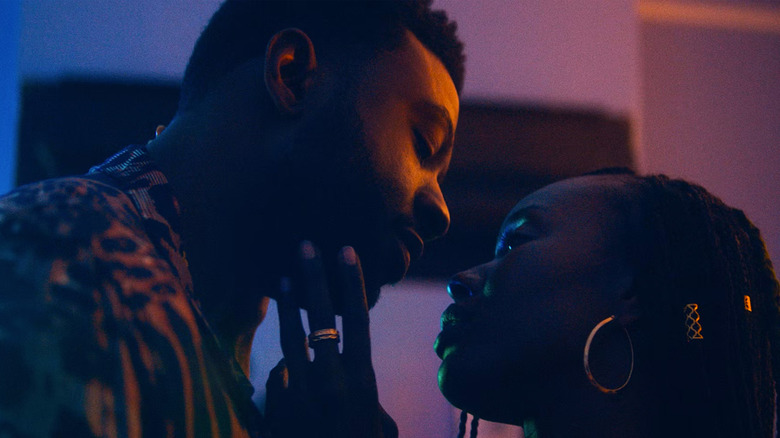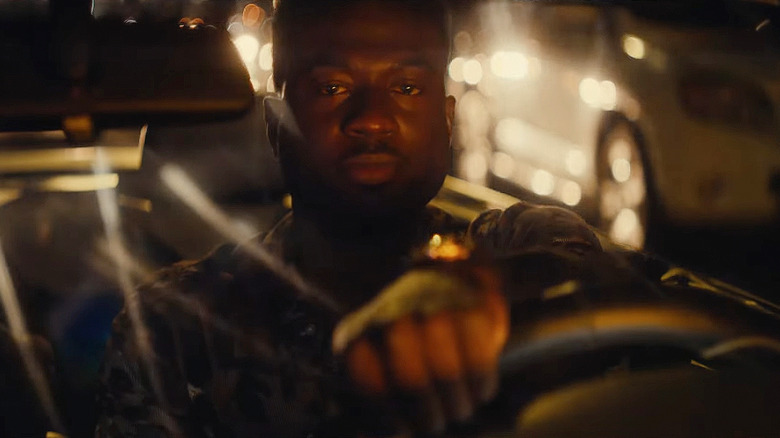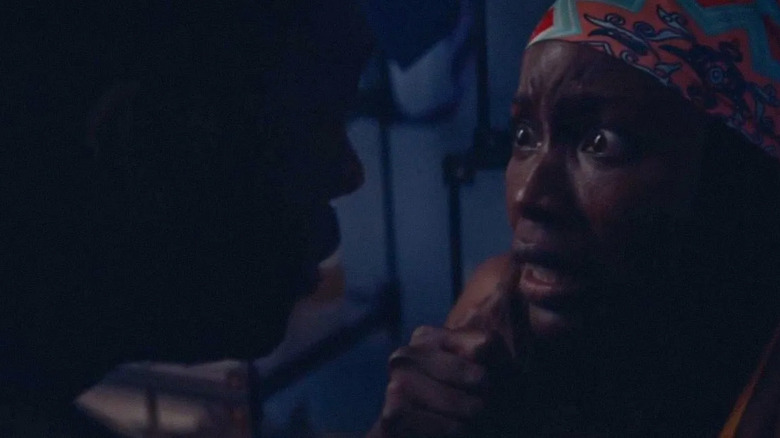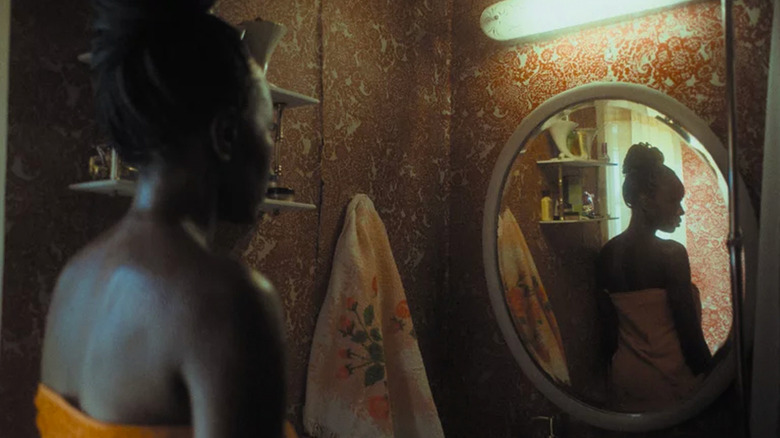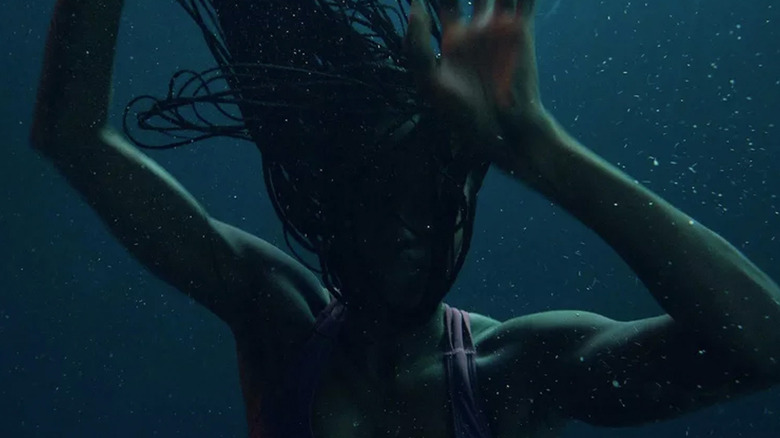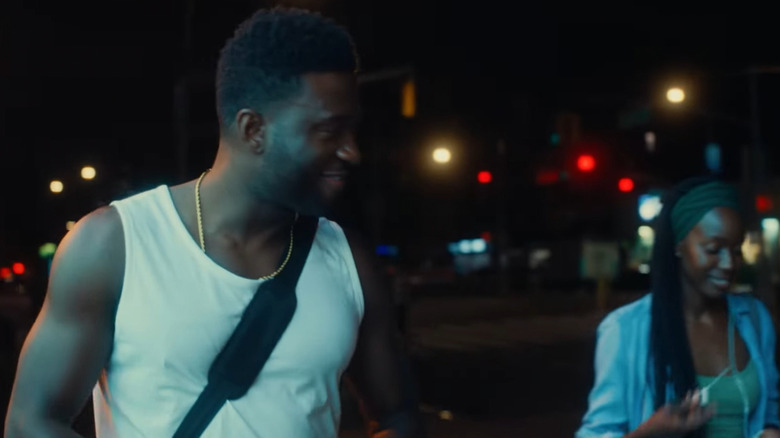Nanny Actor Sinqua Walls On Showing Up And Advancing Untold Narratives [Exclusive Interview]
Patience has been the name of the game for so many involved in "Nanny." The cast and crew of Nikyatu Jusu's debut feature have been working tirelessly for years, but the release of the film has created something of a watershed moment for each of them. One cast member on a particular hot streak is Sinqua Walls, who previously broke out in "Teen Wolf" (as the series' first Black werewolf) and "Once Upon A Time" (as television's first Black Lancelot). Both castings felt revolutionary when they happened ten years ago, and though he's worked consistently since — as "Soul Train" creator Don Cornelius in "American Soul," among other things — it can still feel like a novelty to see Black heroes taking up space.
Still, change is happening, and if Walls' upcoming projects are any indication, the actor's hard work is paying off in a major way. Walls is set to star in a remake of "White Men Can't Jump" alongside Jack Harlow, as well as a feature adaptation of the Comedy Central short "The Blackening," which earned big buzz at the Toronto International Film Festival. But first, there's his delightful turn in "Nanny."
In the film, Walls plays Malik, the grounding force in a story consumed with specters, spirits, and subtle prejudices. Though he does provide a bit of moral support to Aisha (Anna Diop) — a young caregiver struggling with all of the above — he seems to understand that her journey, her burden, is hers to bear. And evidently, so does Walls. Like Diop, and his director, Jusu, Walls is quick to give credit where it's due, and to bring his own ideas to the table when applicable. It lends a beautiful, natural sense of collaboration to "Nanny" — and it's a trend Walls hopes to continue in future projects.
I recently spoke with Walls about his role in "Nanny," his journey thus far, and the importance of gratitude in the business.
This interview was lightly edited for clarity and brevity.
'When I know I'd watch regardless and support someone else that I know, it's a great piece of material'
How did the project first find you? Do you remember the gut reaction you had after first reading the script?
The process of the project first finding me was very organic. At first, I got a call from my agent saying that there was a script that she had really appreciated and fell in love with, and that I should read it and give her my thoughts. She was like, "If you enjoy it, then there's a future conversation with you and the filmmaker, Nikyatu [Jusu]." So I read it just naturally, just off of the recommendation of someone whose words I respect deeply. I read it and fell in love with the script, fell in love with the story, fell in love with the words, fell in love with the character.
The next step was meeting with Nikyatu. And then I fell in love with her and I was like, "Wow, she's so thoughtful. She's so specific, she's so real and she's so nuanced." And she had done a great job of really being able to articulate not only the horrific elements, but also the naturalistic elements of the story. And I was like, "You know what? Even if I'm not in it, I'm going to watch it." Obviously I was hoping it was going to be me, but either way, when I know I'd watch regardless and support someone else that I know, it's a great piece of material. And thankfully, Nikyatu thought it was me. So it was all good.
Your role in the film is very much this breath of fresh air in the midst of so much tension and terror, which is so important for such a heavy film. What was it like building that chemistry with Anna?
That was, I think — and I always say this — it's the testament to Anna more than it even is a testament to me. I think Anna came in with such a graciousness and an openness and an ability to transition from those darker moments to being in those light-filled moments. As an actress, she gave herself the license to do so, and she did it seamlessly. There were times when I came in midway through the day and they had just filmed a very heavy scene in the apartment and she would transition so quickly to being able to share the space with Malik. We were able to find that each and every time. So we made a commitment to each other of always wanting to, essentially, not leave each other behind in a scene and just make sure that we were just present for one another. And like I said, she showed up with that heart each and every time, open, and had the ability to transition. Really, I have a debt of gratitude to her for it.
'Here's the words, here's the skeleton, now fill it up with what you want'
In your day to day, you're refreshingly vocal about mental health — and it's something that seems to inform your character in "Nanny," especially in the "Ten toes down" scene. How did that come about? Was it improv in the moment, or something you thought about before and went to Nikyatu with?
Oh wow. It was a bit of both, honestly. I think there's the skeleton that is Nikyatu's pages and her words, and then there's the license that she gave me to really be able to inhabit and expand on it. So if there's any dialogue that I felt was like, in context to what her voice wanted to be in the moment, she gave me the license to do it, whether it was saying "ten toes" or saying "we're clear, we're here, look at me" ... whatever that was, she gave me this space to say, "Use this as a template and then expand it to your own voice."
To me, that's what makes her a great filmmaker, because she would always be like, "Hey, here's the words, here's the skeleton, now fill it up with what you want. And as long as it's in the direction of where we want to go, I'm not precious on what you say." And I think that was so freeing. And again, in the elements of mental health, it does play because we're all going on that journey. And I think the ability for Malik to support Aisha is to know where she's at in this journey and how he can show up and be present, because he understands what she's going through.
'I stepped into that opportunity with gratitude, not even knowing the magnitude of it until later'
You were within that handful of Black actors in that first colorblind casting wave of the 2010s. You were the first Black Lancelot, which is something I will never forget. Have you thought about how colorblind casting — or even just Black protagonists — have you thought about how that's slowly becoming more normalized in Hollywood?
I definitely think we've seen the evolution, right? I think the genesis of where we started to really get into that space of duality and casting and casting across lenses of color, I'm grateful to have been a part of it. Funny enough, when I walked in to audition for "Once Upon a Time," I did not even know that it was [for] Sir Lancelot. You get these audition pages and they're just sides. And it said "Knight" — it just said "Knight." I went in for the producers and the studio and I did the whole audition. And I'm like, "Okay, cool." My agent calls me at the time and she was like, "You booked it." I was like, "Oh cool. What did I book?" And she was like, "You booked 'Once Upon a Time,' you're going to be Sir Lancelot." And I was like, "Well I auditioned for Knight. Are you sure they called the right guy?" And she was like, "Yes. They were dummy sides." That was always the funniest thing to me.
I stepped into that opportunity with gratitude, not even knowing the magnitude of it until later. And even more gratitude came — but not just with myself, but like you said, with so many people that are getting the opportunities now to tell all kind of stories regardless of color. I just pray that we continue it. I pray that we continue to just expand across so many platforms and so many different genres of everything and just say, "Okay, it's not necessarily color, but it's also just texture. Who are these characters and what do they inhabit and what stories are they telling?" And you look at it and we just continue to expand on that. I just pray that we continue to expand it.
'I've always had an affinity for the fact that [Marvel] characters have lived real experiences
We're living in a time now when Marvel superhero IP has become kind of a given for storytellers. And I know you, years ago, a long time ago, expressed interest in one day playing a hero...
[Laughs] Wow. You're good! And this was on the carpet at the MTV awards, right?
Yes, I think so!
Oh my gosh. Yeah — but tell me what I said. I remember vaguely.
I think you were just like, "I would do seven or eight Marvel movies." Is that still something on the bucket list for you?
It is. It's funny ... you're bringing it back to me because I'm like, "Wow, I do remember saying that." But I would. I think what I love about the Marvel universe is, again, in conjunction with the mental health aspect is how so many Marvel characters — having grown up a comic book fan myself — they had such a level of realness and humanity to them. I saw those characters go through — as I expanded into the comic books, I would see them go through relationships. I remember in the comic books that I read, Rogue and I think Gambit got married and they actually had a baby. And they went through a moment where they broke up and were at odds and I'm like, "Wow, this is real life." So I've always had an affinity for the fact that the characters have lived real experiences. And the stories are always well done. They take their time over there. So yeah, that's still a goal, for sure.
Are you from [Louisiana]?
My family's originally from Shreveport, Louisiana. I grew up in Los Angeles. I grew up in the Crenshaw District.
Okay, because I was about to say: You and Gambit...
Oh look here, if they want to go that way, I'm ready. I will jump in. My accent will be on point.
'Whatever is happening in the world, I somehow want to be a part of telling the story that advances it for progression'
Apart from superheroes, is there any other genre or a story that you would love to explore in the future?
Wow. Honestly — and I hate to sound cliché because ... so many actors probably say this — but it's limitless. I think for me, it's always wanting to paint with a different paint brush every time and inhabit stories [and] characters that are indicative of life that's happening. The one throughline for me is always that whatever is happening in the world, I somehow want to be a part of telling the story that advances it for progression. And so I look at stories now definitely more than I did when I first became an actor. I was like, "Okay, I just want to perform and do well and make sure I did good in the scene." And now I'm like, "Well, how is this going to create an even greater narrative for us?" Like you say, colorblind casting — but how do we create more affirmations of acceptance in so many different elements?
If I'm a part of those stories as an artist, I'm grateful and I'm happy. And they can be in any genre — it can be comedy, it can be Marvel, it can be horror, it can be suspense. It can be even a foreign film of any kind. I'm not precious on it because I want to be able to say, "Okay, we're doing things that I can look back and go, 'That was a part of the progression in society and I'm grateful.'"
I don't think that's cliché. That's a really thoughtful way of looking at it.
Okay. Yeah, you never know ... Look at even something like "Joker." That person's struggling with something, and then we get the understanding and the genesis of what created this kind of super villain. If we look at that, that's a pillar of how important it is to tap in with your people and say, "How are you? Are you okay? How can I show up for you?" There's a mental health struggle going on there. So it's like, where do those elements play that we don't realize, no matter what the genre is and what the subtext is underneath it? I'm always [wondering] what that's going to be, so that it can stand the test of time.
"Nanny" arrives on Prime Video on December 16, 2022.
